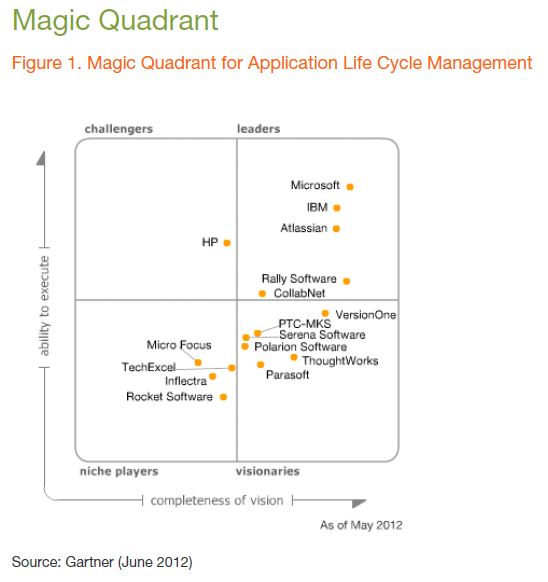Microsoft Leader in ALM Technology
If you’ve been following this blog then it should come as no surprise that I’m a big proponent of Visual Studio (VS) and Team Foundation Server/Service (TFS). While the days of VB6 and Visual Source Safe (VSS) were classic and grand, the capabilities found today in VS and TFS easily surpass those of the old. This is why it’s great to see Microsoft’s effort in the Application Lifecycle Management (ALM) space being recognized accordingly.
In a new Magic Quadrant (MQ) report, Gartner recently evaluated 16 ALM vendors, rating them on the completeness of their vision and ability to execute. Microsoft received the top placement in the MQ and was one identified as “one of the only vendors to cover all aspects of the Software Development Lifecycle.” The report was released June 5, 2012 under the title “Gartner Magic Quadrant for Application Lifecycle Management” by analysts Thomas Murphy and James Duggan.
Gartner evaluated how the ALM market is evolving to support the enterprise software development lifecycle. Gartner sees the ALM market evolving and expanding, driven by key market factors such as agile and cloud.
This graphic was published by Gartner, Inc. as part of a larger research document and should be evaluated in the context of the entire document. The Gartner document is available upon request from Microsoft
* Gartner does not endorse any vendor, product or service depicted in its research publications, and does not advise technology users to select only those vendors with the highest ratings. Gartner research publications consist of the opinions of Gartner's research organization and should not be construed as statements of fact. Gartner disclaims all warranties, expressed or implied, with respect to this research, including any warranties of merchantability or fitness for a particular purpose.
Please note that the 2012 Magic Quadrant report is based on Visual Studio 2010. In Visual Studio 2012, improvements have been made in terms of stronger collaboration and the reduction of waste at each stage of the product delivery in order to help teams deliver quality software faster.
Speaking of Visual Studio 2012, if you haven’t already downloaded the Release Candidate or just don’t have the time to install of the components (i.e. SQL Server, TFS, SharePoint, Office, etc.) then you should definitely check out Brian Keller’s blog as he’s just posted a Visual Studio 2012 Virtual Machine with Hands-on-Labs and Demo Scripts.
